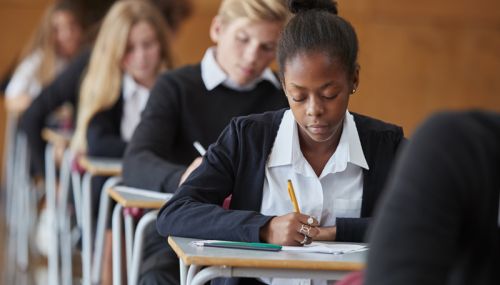
- Our studies
- Our research
- Publications and resources
- Data access and training
- About
- News
- Events
- Get in touch
- Join our mailing list


Young people of all academic abilities are more likely to fare better in their GCSE exams if they have confidence in their school work, new research shows.
The UCL Institute of Education study analysed data from Next Steps, a study of 16,000 people born in 1989-90 who attended secondary school in England. The researchers looked at pupils’ reports on their own academic ability, completed at age 14, dividing them into five groups, from those who had the least confidence in their school work to those who had the most belief in their ability. They then examined GCSE exam results at age 16, converting pupils’ grades into scores. The scores ranged from 16 points for a Grade G, to 58 points for an A*, with each grade increase worth an additional 6 points.
A range of background factors that may have affected pupils’ exam grades were taken into account, including ethnicity, gender, prior educational attainment as measured by their Key Stage 2 assessments at age 11, special educational needs status, type of school, family social class and income, and parents’ level of education.
Overall, young people who had the greatest belief in their academic ability were 18 per cent more likely to achieve five ‘good’ GCSE passes, at grade C or above, compared to those who had the least confidence in their school work. In terms of total GCSE scores, those who had the most academic self-belief gained, on average, 41 points more in their GCSEs, compared to those who had the least confidence, which was equivalent to achieving over six A grades rather than six Bs.
The study’s authors then examined how academic self-belief helped pupils of different abilities. The most able pupils with the greatest confidence in their school work were 19 per cent more likely to achieve five ‘good’ GCSE passes than similarly able young people who had the least self-belief. For total GCSE scores, those who had the most academic self-belief scored, on average, 43 points more than their less assured peers. This difference was equivalent to achieving seven GCSE A grades rather than seven Bs.
Among the least able pupils, those who reported the most academic self-belief were 15 per cent more likely than those with the least confidence to gain five ‘good’ GCSE passes. For their GCSE scores, they gained, on average, 21 points more than those with the lowest academic self-belief, a difference equal to achieving almost four GCSE A grades compared to almost four Bs.
The findings showed that the better pupils performed in their earlier school assessments, the more likely they were to report confidence in their academic ability later on. Girls tended to report lower academic self-belief than boys, and white pupils were, on average, less confident than their ethnic minority peers. Pupils from deprived backgrounds were less likely to have confidence in their school work, compared to their more advantaged peers, and those with parents educated up to GCSE level tended to have less academic self-belief than those with more educated parents.
The study’s authors said: “We are unable to elaborate on what it is about having academic self-belief that helps pupils to produce better GCSE grades. It may be that pupils with more confidence in their school work are able to enter GCSE exams in a more relaxed manner, which might enable them to fare better than their similarly able, but less confident peers. It may also be that their increased self-confidence already means they have their educational pathway through A-levels and university mapped out and are therefore invested in making it happen through more time spent on revision and homework than their less confident peers.
“The implications of these findings would seem to suggest that if policymakers and teachers were to focus on increasing pupils’ academic self-belief, they might also increase their GCSE performance. Teachers and parents could be encouraged to build this aspect into educational interactions with children, and programmes to instil confidence in pupils could be easily incorporated into their learning. As there appears to be reciprocal relationship between academic self-belief and achievement these exchanges should occur early in the child’s learning and be continued throughout their education.”
Further information
‘Does academic self-concept drive academic achievement?’ by Kirstine Hansen and Morag Henderson, was published in the Oxford Review of Education in April 2019.
Ryan Bradshaw
Senior Communications Officer
Phone: 020 7612 6516
Email: r.bradshaw@ucl.ac.uk